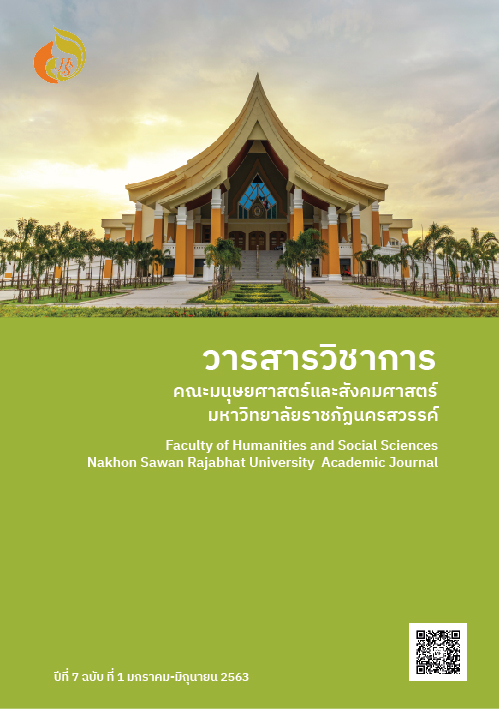การจัดการเรียนรู้ด้านการเขียนแสดงความคิดเห็นแบบเน้นภาระงาน เพื่อพัฒนาทักษะการเขียนภาษาไทย
Main Article Content
บทคัดย่อ
การวิจัยครั้งนี้มีวัตถุประสงค์เพื่อพัฒนาแผนการจัดการเรียนรู้แบบเน้นภาระงานในการพัฒนาทักษะการเขียนแสดงความคิดเห็นวิชาภาษาไทย ศึกษาผลสัมฤทธิ์ด้านการเขียนแสดง ความคิดเห็นก่อนเรียนและหลังเรียน และสอบถามความพึงพอใจของนักเรียนที่มีต่อกระบวนการจัดการเรียนรู้แบบมุ่งเน้นภาระงานเพื่อพัฒนาทักษะการเขียนภาษาไทย กลุ่มตัวอย่างที่ใช้ในการวิจัยคือนักเรียนชั้นมัธยมศึกษาปีที่ 3 โรงเรียนสามชุกรัตนโภคาราม อ.สามชุก จ.สุพรรณบุรี ซึ่งได้มาจากการเลือก กลุ่มตัวอย่างแบบเจาะจง (Purposive sampling) จำนวน 40 คน ที่มีผลการสอบโปรแกรมประเมินสมรรถนะนักเรียนมาตรฐานสากล (Programme for International Student Assessment หรือ PISA) อยู่ในเกณฑ์ระดับต่ำกว่าค่าเฉลี่ยระดับประเทศ สถิติที่ใช้วิเคราะห์ข้อมูลได้แก่ ค่าความถี่ ค่าเฉลี่ย ค่าส่วนเบี่ยงเบนมาตรฐาน และสถิติการทดสอบค่าทีแบบกลุ่มไม่อิสระ ผลการวิจัยพบว่า 1) คะแนนเฉลี่ยผลสัมฤทธิ์การเขียนแสดงความคิดเห็นหลังเรียนในนักเรียนกลุ่มตัวอย่างสูงกว่าก่อนเรียนอย่างมีนัยสำคัญทางสถิติที่ระดับ .05 2) ความพึงพอใจของนักเรียนที่มีต่อการจัดการเรียนรู้ด้านการเขียนแสดงความคิดเห็นแบบเน้นภาระงานเพื่อพัฒนาทักษะการเขียนภาษาไทยโดยรวมอยู่ในระดับมาก (x̄ = 4.19 , S.D. = 0.92)
สรุปได้ว่า การจัดการเรียนรู้ด้านการเขียนแสดงความคิดเห็นแบบเน้นภาระงานเพื่อพัฒนาทักษะการเขียนภาษาไทย สามารถพัฒนาความสามารถในการเขียนภาษาไทยของนักเรียนชั้นมัธยมศึกษาปีที่ 3 ได้ และนักเรียนมีความพึงพอใจในการจัดกิจกรรม สมควรที่จะนำไปจัดกิจกรรมเพื่อพัฒนาความสามารถในการเขียนต่อไป
Article Details
เอกสารอ้างอิง
พนอ สงวนแก้ว. (2554). รูปแบบกิจกรรมการอ่านเน้นภาระงาน. วารสารศิลปากรศึกษาศาสตร์วิจัย. 2 (2): 69 -81.
มาลี บุญศิริพันธ์ (2550). วารสารศาสตร์เบื้องต้น: ปรัชญาและแนวคิด. กรุงเทพฯ: มหาวิทยาลัยธรรมศาสตร์.
รุ่งฤดี แผลงศร. (2557). การเขียนบทความสำหรับสื่อสิ่งพิมพ์. กรุงเทพฯ: สำนักพิมพ์แห่งจุฬาลงกรณ์มหาวิทยาลัย.
ลม่อม ศรีเจริญ. (2544). การพัฒนาบทเรียนภาษาอังกฤษเทคโนโลยีการเกษตร 1 โดยใช้กิจกรรมการเรียนแบบเน้นงานปฏิบัติ ของนักศึกษาระดับประกาศนียบัตรวิชาชีพชั้นสูง ชั้นปีที่ 1 (วิทยานิพนธ์ปริญญามหาบัณฑิต). เชียงใหม่: มหาวิทยาลัยเชียงใหม่.
วัฒนา แช่มวงษ์ (2556). การเขียนบทความ. กรุงเทพฯ: โอเดียนสโตร์.
อาลิษา อนันเอื้อ (2558). การบูรณาการกิจกรรมเน้นภาระงานกับกลวิธีเสริมต่อการเรียนรู้เพื่อพัฒนาความสามารถในการเขียนภาษาอังกฤษ (วิทยานิพนธ์ปริญญามหาบัณฑิต). มหาสารคาม:มหาวิทยาลัยมหาสารคาม.
Christoper, G. (2005). Intergrating extensive reading in the task-basked curriculum. ELTJournal 59 (4): 306-31.
Ellis, R. (Ed.) (2005). Planning and task performance in a second language. Amsterdam: John Benjamins.
Harmer, J. (2007). The Practice of English Language Teaching (4THed.). Harlow: Longman.
Macaro, E. (2006). Learning strategies in second and foreign language classrooms. London: Continuum.
Manchón, R.M. (2014). Learning and teaching writing in the foreign languages classroom: Fostering writing-to-learn approaches. London: Routledge.
Nunan, D. (1985). Designing tasks for the communicative classroom. Glassgrow: Bell & Bain Ltd.
Richards, J. (1984). The context of language teaching. Cambridge: Cambridge University Press.
Skehan, P. (1996). A Framework for implementation of task-based instruction. Applied Linguistic.
Sue, Z. Beers. (2011). Teaching 21st Century Skills: An ASCD Action Tool. Boston: Cengage Learning.
Willis, J. (1996). A framework for task-based learning. London: Longman.
Willis, D., & Willis, J. (2011). Doing Task-Based Teaching. Oxford: Oxford University Press.


